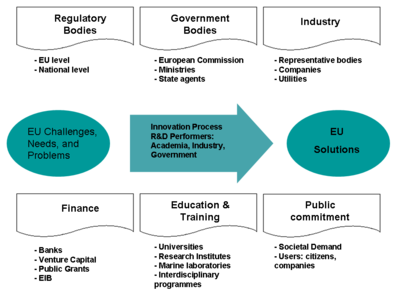How can Marine Sciences help?
Contents
A comprehensive knowledge of marine life is essential for sustainable resource management and the economic sustenance of human societies. In order to achieve this aim, Marine Genomics Europe will unite individual teams in their research efforts to attain world-wide excellence in the field of Marine Genomics. It will expand the frontiers of emerging research forward and make major breakthroughs. This will be of particular use in other sectors such as health, fisheries, tourism, and agriculture.
Who is involved in the network?
The organisation of the Marine Genomics research community directly affects its efficiency and social impact. It is organised at various levels, from the field to the academic lab, to R&D, and implementation to the level of regulatory bodies providing national and international (e.g., EU) regulations.
Main stakeholders involved in the network:
Needs for knowledge:
- Multilateral interests in genomics in marine research are not represented by any specific agency, but rather by groups such as the Food and Agriculture Organisation (FAO), the European Fisheries and Aquaculture Research Organisation (EFARO) and the network of Marine Research Stations (MARS) include genetic and genomic research in their remit. Marine interests are also represented by the International Oceanographic Council of UNESCO (IOC) and the International Council for the Exploration of the Sea (ICES), and professional organisations such as the European Federation of Marine Science and Technology Societies (EFMS - including 6000 members, 200 institutions), the American Society of Limnology and Oceanography (ASLO), the International Association of Genetics in Aquaculture (IAGA) and the Sustainable Farm Animal Breeding and Reproduction Technology Platform (FABRE TP).
- Industry: Large companies, SMEs,
- Civil society: Citizens, Associations,
- Public Authority: Policy makers.
Marine genomics and biotechnology also contribute to national law and international treaties such as the UN Convention on the Law of the Sea (UNCLOS) and the UN Convention on Biological Diversity.
Generation of knowledge:
- Knowledge and expertise in Marine Genomics is largely based in academic and government research agencies (e.g., CSIC - Spain, NERC - UK, CNRS - F, MUIR - It, MPI - D), and in a growing number o companies (e.g., all major pharmaceutical
companies but also enterprises such as Prokarya, Biomérieux and Intervet) and in private foundations such as Volkswagen Foundation (Germany), Calouste Gulbenkian foundation (Portugal) and Solvay Foundation (Belgium). - Traditionally sample collection depends on coastal biological stations and ocean going vessels, some of them designed for operating under demanding circumstances such as the deep-sea, open ocean and polar regions.There is an increasing interest in developing automated stations and remote sensing for both classical water chemistry measurements and novel methods (including genomics) of environmental monitoring. It is expected that such stations will be adapted to serve applications such as fisheries management and weather prediction, as well as more academic requirements. - With regard to genomics, laboratories of all kinds in universities, biological stations (in which Europe has a particularly rich tradition) and government agencies provide capacity for genomic analysis. Most often, advanced high-throughput sequencing and structural analyses are provided by associated non-marine laboratories such as the Genoscope (Paris), the Sanger Institute (Cambridge) and the Max Planck Institute for Molecular Genetics (Berlin). These specialized laboratories provide a second pool of resources, which demand a high level of capital investment. - Scientific information is communicated through various online news groups, via list servers to peers at conferences (e.g., annual European Marine Biology Symposium, Marine Genomics 2006, International Marine Biotechnology Conference 2007) and in scientific journals (SCI publications between 2001-2006 under the key words marine/ocean*genomic/genetic reach > 3,500 references). In addition, communication to the R&D community is via newsgroups, professional journals (e.g., Marine Biotechnology and Marine Genomics) and websites (e.g., Federation of European Aquaculture Producers).
